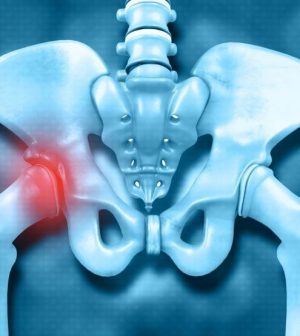- Could Your Grocery Store Meat Be Causing Recurring UTIs?
- Are You Making This Expensive Thermostat Error This Winter?
- Recognizing the Signs of Hypothyroidism
- 10 Strategies to Overcome Insomnia
- Could Artificial Sweeteners Be Aging the Brain Faster?
- Techniques for Soothing Your Nervous System
- Does the Water in Your House Smell Funny? Here’s Why
- Can a Daily Dose of Apple Cider Vinegar Actually Aid Weight Loss?
- 6 Health Beverages That Can Actually Spike Your Blood Sugar
- Treatment Options for Social Anxiety Disorder
Hip Replacements No Riskier for Folks Living With HIV

Hip replacement surgery is safe for HIV patients, a new study shows.
Some surgeons are reluctant to perform total hip replacement surgery on patients with HIV or AIDS, because of concerns about complications, including higher risk of infection, need for repeated surgery and longer hospital stay.
“Patients living with HIV are at a higher risk for orthopedic-related diseases such as osteoarthritis or osteonecrosis of the hip, due to changes in their bone metabolism and effects from their medication regimen,” explained researcher Dr. Senthil Sambandam, an assistant professor of orthopedic surgery at UT Southwestern Medical Center in Dallas.
“With improvements in HIV treatment leading to increased life expectancies, we are seeing a rise in the need for [hip replacement] procedures in this patient population,” he added in a medical center news release. “Our study demonstrates that HIV-positive patients can safely undergo [hip replacement] … and adds to the growing amount of literature that encourages surgeons to deliver appropriate medical care to a marginalized patient population.”
For the study, researchers compared postoperative complications in 504 HIV patients who had hip replacement surgery with 493 non-HIV patients. They used 2016-2019 data from a nationwide inpatient sample.
The data showed that complications after surgery, such as pneumonia, infection near the implant, wound reopening and surgical site infection were not significantly different between the HIV-positive and HIV-negative patients.
Blood transfusion rates also were lower among HIV patients.
“These are important findings because they can help alleviate worries among the medical community about treating a group of patients who are often overlooked,” Sambandam said. “It’s an important quality-of-life issue for many HIV-positive patients.”
The findings were published July 26 in the Journal of Clinical Orthopaedics and Trauma.
More information
For more on hip replacement, head to the American Academy of Orthopedic Surgeons.
SOURCE: UT Southwestern Medical Center, Dallas, news release, July 26, 2023
Source: HealthDay
Copyright © 2026 HealthDay. All rights reserved.










